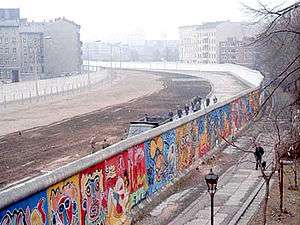Winfried Freudenberg
| Winfried Freudenberg | |
|---|---|
| Born |
29 August 1956 Osterwieck |
| Died |
8 March 1989 (aged 32) Zehlendorf |
| Cause of death |
Home-made gas balloon crash whilst attempting to leave East Berlin 52°25′47″N 13°13′26″E / 52.4297°N 13.2239°E |
| Body discovered |
Backyard of a garden villa in Zehlendorf 52°26′01″N 13°15′38″E / 52.4336°N 13.2606°E |
| Residence | Prenzlauer Berg |
| Occupation | Electrical Engineer |
| Known for | Last fatality in an attempt to defect from East Germany across the Berlin Wall |
Winfried Freudenberg (29 August 1956 – 8 March 1989) was the last person to die in an attempt to escape from East Germany to West Berlin across the Berlin Wall.[1][2][3]
Biography
Freudenberg was born in Osterwieck, and grew up in the Saxony-Anhalt town of Lüttgenrode, near what was then the border between his native East Germany, which was then a part of the communist Eastern Bloc, as a satellite state of the Soviet Union, and West Germany. After working as an apprentice electrician, he trained as an electrical engineer in a Volkshochschule (trade school). In the Autumn of 1988 he married Sabine, a student he had met in school. Unable to find work, the couple had become increasingly disappointed about being unable to cross the border, several hundred metres away.[1] Two weeks before the wedding, Freudenberg had decided to escape to the west with his wife, and immediately after the wedding the two began planning a trip by homemade balloon filled with natural gas[1] (because its main component, methane, is lighter than air, natural gas can serve as a lifting gas).
As part of their plan, Freudenberg took a job in a local gas refinery, and the two took an apartment in the East Berlin neighborhood of Prenzlauer Berg. In January and February 1989, they began assembling a 13 metre tall by 11 metre diameter balloon out of polythene tents, which they cut into strips and taped together. On the evening of 7 March they decided that the wind conditions were favourable for their escape, and at midnight went to the station where Freudenberg worked and began to fill their balloon with gas. A young unemployed student noticed them, and called the local police at 1:30. They panicked when they saw a patrol car approach. Because the balloon was not yet full enough to lift both of them they decided for Freudenberg to escape alone, and cut the tether cables with him inside. However, without Sabine there was not enough ballast and the balloon rose too fast. It severed a power line shortly after launching. Although East German security had often shot and killed citizens attempting to escape, they decided against shooting Freudenberg because of the possibility that bullets could trigger an explosion of the natural gas inside the balloon.[1]
Freudenberg spent several hours aloft. He passed over the Berlin Tegel Airport in West Berlin, where he apparently had intended to land, at an altitude of 2,000 m. At 7:30 the next morning he fell into the garden of a villa in the suburb of Zehlendorf (West Berlin). The direct cause of the crash is unknown.[1] The remains of the balloon came down on the median strip of a thoroughfare, whereas Freudenberg's body was discovered hours later and several blocks away in a back yard. Freudenberg evidently died instantly from injuries from the crash.[4] Nearly every bone in his body had been broken and virtually every internal organ had been damaged.[5]
After the incident, East German police investigated the friends, family, acquaintances, and colleagues of Freudenberg and his wife, to determine whether any had participated in the escape attempt. Because of international attention and pressure over the recent shooting over Chris Gueffroy, the last refugee to be shot by East German border guards, Sabine was given the relatively lenient sentence of three years of probation, and then granted amnesty in October 1989. The next month East Germany began allowing its citizens to travel to the west, and several months later the Berlin Wall was dismantled and the two countries reunified.[1]
References
- 1 2 3 4 5 6 Martin Ahrends; Udo Baron & Hans-Hermann Hertle. "Chronicle of the Berlin Wall". Deutschlandradio.
- ↑ "Balloon Tragedy". Weekly World News. 1989-05-02.
- ↑ "Berlin Pays Tribute to Last Person Shot Crossing Wall". Spiegel Online International. 2009-02-06. Retrieved 2009-05-23.
- ↑ Tony Paterson (2006-08-12). "Revealed: Tragic victims of the Berlin Wall". The Independent.
- ↑ The Victims at the Berlin Wall 1961-1989: A Biographical Handbook
